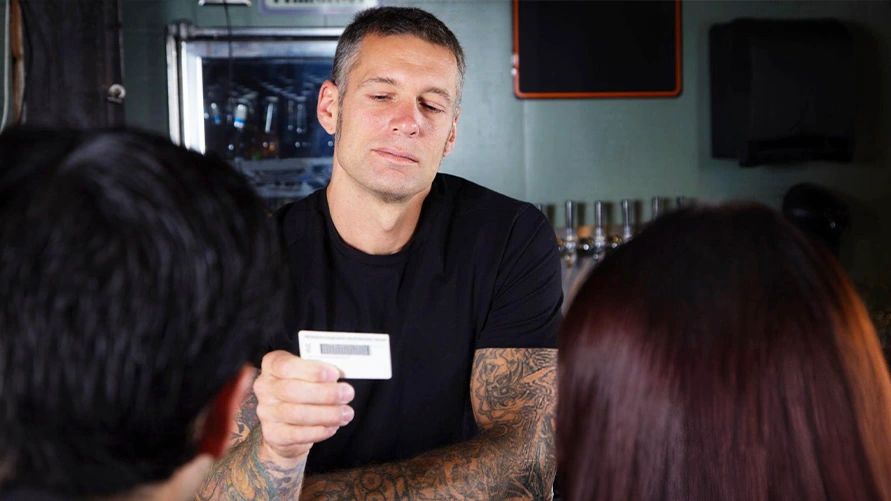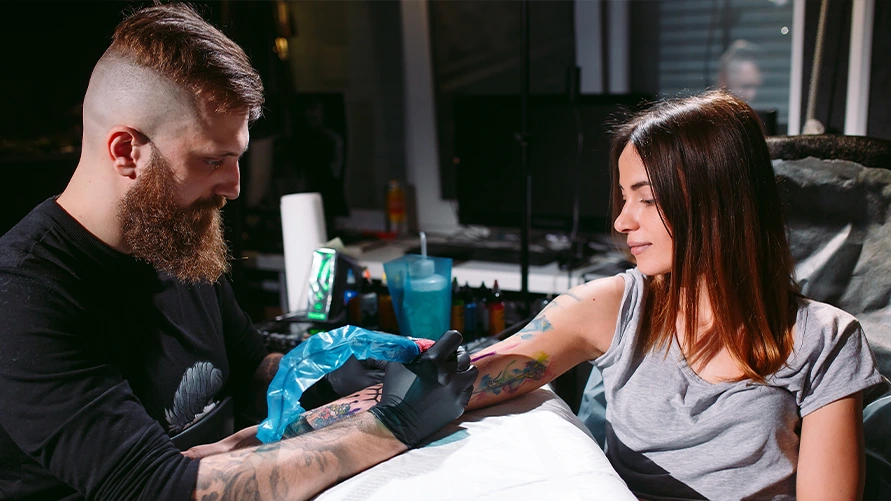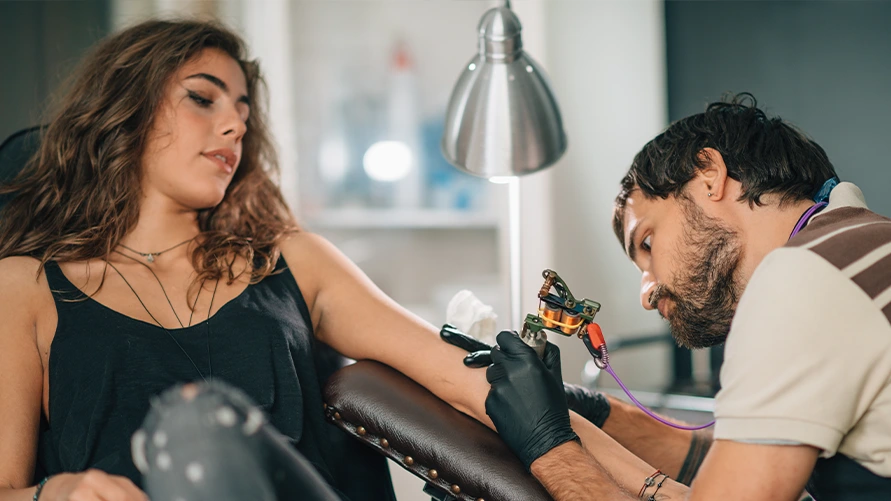Getting a tattoo license in New York starts with one step: completing the Infection Control Course and applying through the Department of Health. No license, no ink. That’s the law. And in a city that never sleeps, the rules matter. A studio without a license isn’t just breaking the law; it’s risking fines, forced closures, and a reputation that can vanish overnight.
Clients today don’t sit down blindly. They ask the big question first: “Are you licensed?” Say ‘yes,’ and you gain trust. Say ‘no,’ and they’re out the door before you open the ink.
This isn’t just paperwork. It’s the heartbeat of your career. With more than 30% of Americans having tattoos and demand climbing, New York is one of the most competitive tattoo hubs in the world. A license proves your studio is safe, your craft is respected, and your future is built to last.

Apply through the New York City Department of Health
The tattoo license in New York comes from one place: the Department of Health and Mental Hygiene. No private groups, no shortcuts—only the Department of Health. Every tattoo artist needs their own license, even if they work in a large shop. This means both studio owners and the artists they hire must go through the process.
Applications can be submitted online or in person. Once you fill out the forms, show your certificates, and pay the fee, you wait for approval. The license usually lasts for two years before renewal. This keeps artists current and the industry safe.
Pass the Infection Control Course first
No course, no license. That’s the rule in New York. Before applying, every tattoo artist must complete the Infection Control Course approved by the Health Department. This course covers the basics of safety: how to sterilize tools, how to handle blood safely, and how to prevent the spread of diseases like HIV and hepatitis.
The reason is simple. Tattooing breaks the skin. Without proper care, it can spread infections. The course makes sure artists know the risks and the right way to prevent them. For studio owners, having staff trained in infection control is not just a requirement; it’s a shield of safety for every client who walks through the door.
Must be 18 years or older to apply
New York law sets the minimum age at 18 to apply for a tattoo license. This rule goes hand in hand with the law that no one under 18 can get a tattoo, even with parental consent. It’s about accountability. Only adults can take responsibility for the serious health and safety risks that come with tattooing.
For studio owners, this means you cannot hire or train minors as tattoo artists. Your staff must all be licensed, and that starts at 18 years old.
Enough space to meet health and zoning laws

Opening a tattoo studio in New York requires more than artistic talent; it requires space that meets legal standards. While the law does not set a fixed square footage, inspectors want a clear separation between clean and dirty zones. The working area must have sinks, sterilization stations, and proper waste disposal.
Many successful shops operate in 500 to 1,000 square feet. This gives room for multiple artists, waiting areas, and sterilization equipment. What matters most is not the size but the setup. A cramped studio that mixes storage, tattooing, and cleaning in the same space will not pass inspection. Health and zoning rules protect both the artists and the clients, so planning the layout carefully is as important as designing tattoos themselves.
Health certifications to protect clients and staff
Besides the Infection Control Course, many artists also complete bloodborne pathogens training. This goes deeper into handling contaminated materials and preventing cross-contamination. Studios may also be required to install and maintain autoclaves, keep records of sterilization cycles, and use proper biohazard disposal systems.
Inspectors check for these details during visits. A clean studio with certified staff not only passes inspection but also attracts clients. People feel safer when they see certificates on the wall and clean, well-organized equipment on the tables.
Must renew your license every two years
Getting a tattoo license is not a one-time task. In New York, licenses expire after two years. Renewal requires paying a fee and sometimes showing proof of refresher training in safety protocols. This system keeps everyone accountable. It ensures that no one tattoos with outdated training or ignores updated health codes.
For studio owners, this means tracking the renewal dates of both your license and your staff’s licenses. Staying ahead of the deadline avoids fines or sudden shutdowns.
Tattooing without a license leads to fines and shutdowns
Working without a license in New York is risky. The Department of Health can issue heavy fines, sometimes thousands of dollars. In severe cases, they can shut down studios and even pursue criminal charges. Reports of unlicensed tattooing are taken seriously, and inspectors act fast on complaints.
The risks are not just financial. An unlicensed tattoo that causes infection can destroy a reputation in days. In an industry built on trust, losing credibility is worse than losing money.
The tattoo industry in New York is growing fast

Tattoos are no longer a fringe trend. They are mainstream culture. According to a Pew Research Centre study, about 32% of Americans have at least one tattoo. In cities like New York, the numbers are even higher. The industry brings in billions every year, and the demand for skilled, licensed artists grows with it.
For studio owners, this means opportunity. More clients are seeking tattoos and are willing to pay for safe, professional work. A license ensures you can tap into this growing market without fear of being shut down.
Apprenticeships build skills before licensing
While the law doesn’t require apprenticeships for licensing, many artists choose to train under a mentor. This hands-on learning is where most skills are built. Apprenticeships teach not only the art but also the safety, the discipline, and the rhythm of studio life.
For studio owners, hiring artists with apprenticeship experience means hiring people who already understand the culture of professionalism. They know how to handle clients, equipment, and emergencies.
Need to budget for fees and setup costs
The path to licensing comes with costs. The Infection Control Course usually costs under $30. The license application fee is about $100. Renewal costs are similar. On top of this, studio expenses like rent, insurance, and inspections add up.
While the costs may seem steep for beginners, they are small compared to the fines for unlicensed work. More importantly, they are part of the investment in building a safe, trusted studio.
Health inspections keep studios accountable
Tattoo studios in New York must pass regular health inspections. Inspectors check for sterilization, waste disposal, cleanliness, and staff certifications. Failing an inspection can mean fines or suspension of the license. Passing builds a reputation for safety.
Clients talk. A studio known for being clean and safe attracts more business. Health inspections, rather than being seen as hurdles, can be turned into selling points.
A license builds trust and career stability
In the end, a license is more than legal protection. It’s a mark of trust. Clients are more likely to return to studios where they feel safe. Word of mouth spreads faster when people know the studio is licensed and professional. In a crowded market, trust becomes the sharpest tool for growth.
Getting licensed is the key to growth in New York
A tattoo license in New York is not just paperwork. It is the foundation of a career. It protects clients, safeguards artists, and opens doors to growth. From infection control training to inspections, every step is designed to keep tattooing safe and respected.
For studio owners, the license is not a barrier but a bridge. It connects passion with professionalism, art with safety, and creativity with lasting success. Beyond the paperwork, running a successful studio also means keeping operations organized, tracking appointments, and maintaining compliance records.
Many studios now rely on tattoo shop software to handle scheduling, consent forms, and license renewals in one place. This not only saves time but also reduces the risk of missing inspection requirements or client documentation.
In a city as competitive as New York, efficiency is as important as artistry. A licensed studio that also invests in smart systems builds trust with clients, attracts more bookings, and creates a smoother experience for both artists and customers. When legal compliance, safety, and professionalism work hand in hand, a tattoo business is not just surviving, it’s thriving.